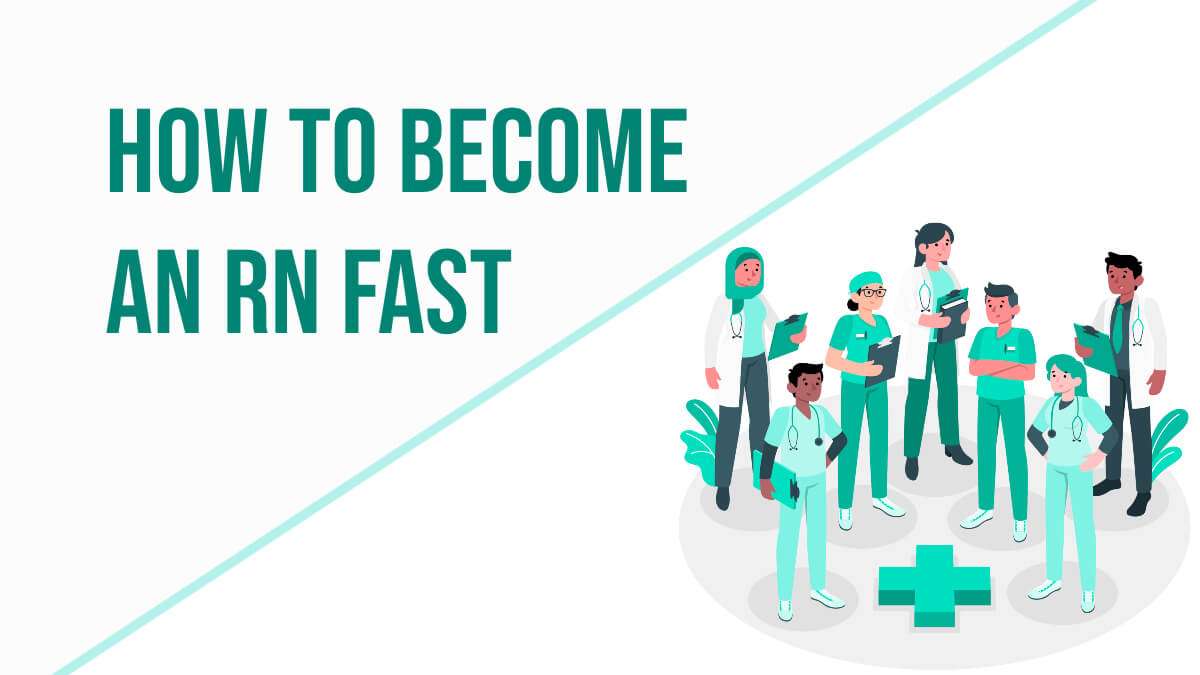
Do you know how to become an RN fast? Rn or the registered nurses are in high demand. RN roles must be filled due to the aging Baby Boomer population’s demand for medical attention and the fact that many nurses are nearing retirement age.
To care for the continual influx of patients, hospitals, skilled nursing institutions, and outpatient clinics are in dire need of registered nurses. Additionally, it is predicted that the nurse shortage will worsen as time passes.
This, however, is nothing new. Media, nursing schools, hospitals, and ads have all made the need for nurses. The shouts have been heard, and the students have answered the call!
Now that so many kids aspire to be nurses, it’s more difficult than ever to get into nursing school!
Numerous potential students have finished their necessary coursework and are impatiently waiting on college waitlists as they repeat classes to get As instead of Bs.
Most of them struggle to combine jobs and education while also participating in voluntary work and extracurricular things to stand out from the crowd.
Also, you can able to know,
Does An RN Do? – Abrupt Overview
Registered nurses are health care professionals that do routine patient care tasks in support of physicians and other medical staff.
Registered nurses support the administrative team by aiding in the creation and upkeep of patient medical records in assisting with medical operations. Other obligations include,
# Physical exams of patients, followed by an evaluation of the findings
# Providing education on the recommended course of therapy and self-care
# Maintaining a clean and secure workplace
# Helping physicians with standard medical procedures
# Giving treatment to people who are ill or wounded
# Controlling other health care workers, such as registered nurses and nursing assistants
# Assisting patients and family members with their emotional needs
# Performing medical procedures and evaluating the outcomes
Read more: How to Become a Surgical Nurse
How To Become An RN Fast – Step By Step Guide
It’s crucial to understand the unique criteria for your state of residence and the location where you want to practice nursing since the exact processes required to become a registered nurse may differ.
That being stated, all states will demand that prospective RNs satisfy the following prerequisites:
Follow a degree
The various nursing degrees require different time commitments, and tuition costs vary from school to school.
You will be in charge of performing the study to choose the degree program most compatible with your career goals and will open up the sorts of work prospects that are essential for you.
You will be in charge of performing the study to choose the degree program most compatible with your career goals and will open up the sorts of work prospects that are essential for you.
Complete the National Council Licensure Examination
You may choose from a range of educational paths once you graduate from high school to become ready to take the National Council Licensure Examination.
The time commitment to complete the many nursing degrees varies, as do the tuition prices at different institutions. As well, if you are willing to learn about how to become a director of nursing, it will be helpful for your future.
You will be in charge of performing the study to choose the degree program most compatible with your career goals and will open up the sorts of work prospects that are essential for you.
Proper research states licensure
After passing the NCLEX-RN test, registered nurses may still need to comply with state laws, such as having their backgrounds checked and completing certain hours of continuing education.
Expectations will differ from state to state, so you must research the regulations in your state.
Someone already employed as a registered nurse in your area might be an excellent person to talk to to get this information. It is within your power to broadening your professional connection by establishing contact with other registered nurses.
An experienced registered nurse might provide insightful information about the sector and guidance for your chosen line of work.
Apply for jobs
You may start looking for open opportunities as a registered nurse after you have earned your degree and certification. Apply for positions that need your greatest degree of training and certification.
Your CV will stand out from the other candidate’s thanks to your skill set and the precise basis of your practical expertise.
By including keywords that were obtained straight from the job description, you may modify your resume to meet the requirements of a particular position.
Read more: How to Become a Genetic Counselor
The Average Salary Of The Registered Nurse
The typical income of a registered nurse will change based on several factors, including the nurse’s degree of experience, educational background, and geographic area.
The national average annual wage for a registered nurse in the Us is $89,310.
Read more: How to Become a Nurse Practitioner Without a Nursing Degree
Top Benefits of Choosing A Nursing Career
Nurses may perform a mix of eight, 10, or twelve-hour shifts. Some people can arrange their schedules so they may work when their kids are in school or work the same hours as their spouse to make the most of their time off together.
Other nurses have regular 9 to 5 M-F shifts, and some even have remote jobs. You collaborate with numerous other nurses in diverse settings.
This implies that switching shifts or finding a replacement is usually not a problem.
Flexibility
The nurses’ shifts can be eight, ten, or twelve hours long, or any combination of these three lengths.
Some people can organize their work schedules to enable them to continue working while their children are enrolled in school. Others can coordinate their shifts with their partners to make the most of their vacation time together.
Some nurses work the typical Monday through Friday, 9 am to 5 pm shift, while others may even be employed in positions that allow them to work from home.
You will collaborate with various other nurses in many different settings. Because of this, exchanging shifts or finding other people to cover shifts is often not a problem.
Making a difference
With every engagement, nurses have the chance to improve the lives of their patients.
By enabling patients to take control of their health, nurses strengthen communities through the life-changing work they do every day.
In their ongoing support of patient safety and patient empowerment, nurses play a significant part in helping patients care for themselves as much.
Job opportunities
The opportunity for nurses to work in a variety of settings is fantastic.
Pursuing nursing careers in various work settings and possessing fundamental skill sets valued in many economies make nurses particularly privileged.
Read more: How to Become a Director of Nursing
Best Registered Nurse Educational Programs
The four alternatives for obtaining a nursing education are as follows. Each degree has its advantages and is appropriate for various nursing career pathways.
To determine which is the best option for you, you will need to perform your study. Options include:
Nursing diploma
This program will offer the fundamental theoretical and practical aspects necessary to begin your career as a nurse.
You can consider attending a community college or a vocational school that offers nursing diploma programs.
Aspiring nurses get training in patient safety, pharmacy, psychology, and medical ethics throughout these programs, which normally run between two and three years.
Nursing degree
A nursing diploma is usually less valuable to employers than an associate degree. The main distinction is that nurses with an associate degree must do a certain number of hours of clinical work before graduating.
An associate program will teach basic nursing concepts like anatomy, pharmacology, and microbiology. You will also take education courses like history, psychology, and math.
When a nursing student finishes school and passes the National Council Licensure Exam, they can either start working as a registered nurse immediately or keep going to school.
Bachelor of Science degree in nursing
It requires a full four years for new undergraduate students to complete the requirements for a Bachelor of Science in Nursing. Still, it only takes two years for registered nurses who have completed an associate degree.
Most hospitals and other health care facilities look for registered nurses who have earned a Bachelor of Science in Nursing degree because these professionals are more likely to advance their careers or be offered jobs with higher responsibility levels.
A graduate of a Bachelor of Science in Nursing program may start working as an RN immediately as they pass the National Council Licensure Examination, much like graduates of associate’s degree programs.
Master of Science Degree in Nursing
However, specialized nursing disciplines may require a Master’s Degree in Nursing. Entry-level nursing employment often needs an associate degree or a Bachelor of Science degree.
Mental health, anesthesia, pediatrics, and emergency care are a few possible specialties.
For a master’s degree, RN with an associate degree normally need to study an extra three to four years, but those with a bachelor’s degree only need to study an additional two to three years.
Not only a registered nurse, but this is also really worth becoming a surgical nurse. Most schools need 500 hours of clinical nursing practice before awarding a master’s degree.
Read more: How to Become a Midwife Without a Nursing Degree
Conclusion
If you have ever thought that your first degree was not the appropriate match for you or if you are waiting for a more satisfying career path, changing jobs to nursing at any age might be a terrific decision for you to consider.
In nursing, innumerable doors may be opened for you to pursue the kind of professional life you’ve always imagined. It provides flexibility and opportunities to make a difference in the society in which you live.
Especially if you’ve been working for a while, there have undoubtedly been changes since you last enrolled in college.
In addition, if you wish to become a nurse practitioner, this guide will be helpful for you in how to become a nurse practitioner as well.
The period when you had little to no control over when your lessons began and concluded is long gone. More so than at any previous point in history, there are currently more accessible nursing schools available.












